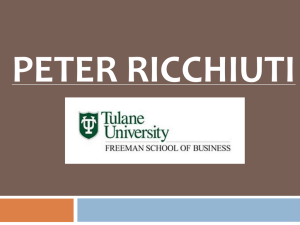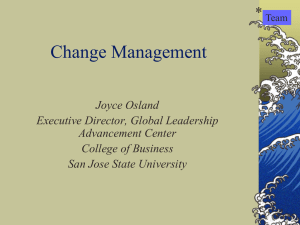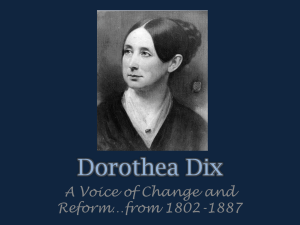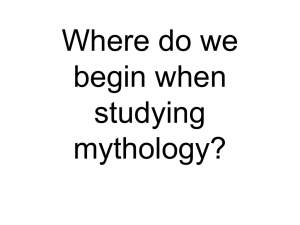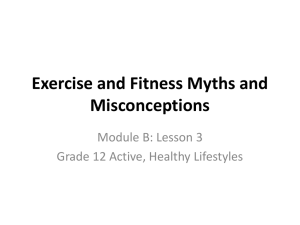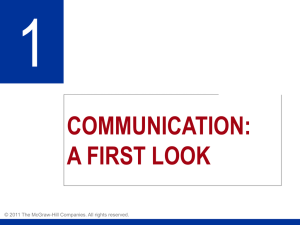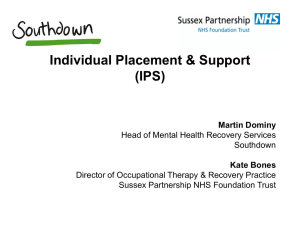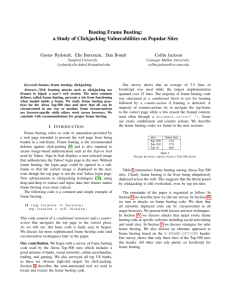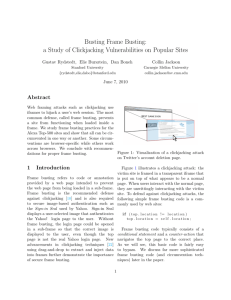Powerpoint
advertisement
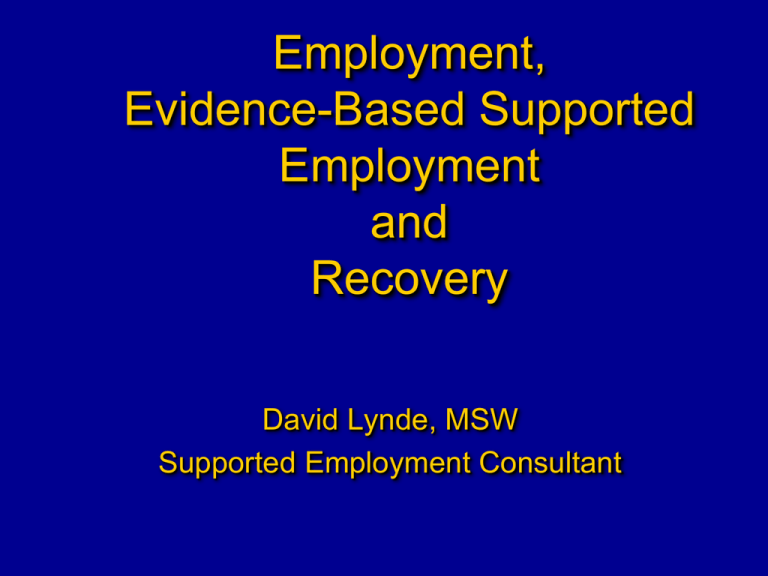
Employment, Evidence-Based Supported Employment and Recovery David Lynde, MSW Supported Employment Consultant Which came first employment or mental health? • Dorothea Lynde Dix • Born, Hampden, Maine, 1802 • Relentless advocate and crusader for people with mental illness From the Biography of Dorothea Lynde Dix… • “The indigent insane and feebleminded usually lived under the most shocking conditions of all. Some communities actually placed their "paupers" on the auction block. Leasing, in effect, "their weak minds and strong bodies" to work for the bidder who made the most attractive offer to the town or county.” From the Biography of Dorothea Lynde Dix… “Dorothea Dix traveled thousands of miles from state to state - by train, coach, carriage and river boat - always systematically gathering facts which she could use to try to convince those in authority of the need of improvement in the care of the mentally ill.” Is This You? “Superior functioning in a wide range of activities, life's problems never seem to get out of hand, is sought out by others because of his or her many qualities. No symptoms.” Is This You? Competitively employed or Capable of being Competitively Employed? Where do Work and Recovery Travel Common Pathways? Where do Work and Recovery Intersect? What is Recovery? What is not Recovery? Recovery? “I need to be given advice and guidance about work so I won’t make any mistakes or fail” Dartmouth PRC 12 Recovery? “I have a dream that someday I will be treatment adherent” Recovery? “Recovery means mental illness is not the center of my world.” Recovery? “My life has enough meaning now that I have a psychiatrist, medications and a case manager.” Dartmouth PRC 15 Recovery? “Someday, I hope to be compliant and a well managed case.” Recovery? “I want a warm and safe place for my family” 17 Recovery? “Before I was really depressed but after I started working, it was a relief. I feel better working…” Recovery? “I want to be the very best mental health client that I can be” Recovery? “I want a good place to live, a sweet car to drive, a good job and a date on Friday night” 20 Young Adults & Recovery • The aspirations of young people following a first episode of psychosis appear to be similar to those of any other young person: wanting to be rich and powerful (Brady 2008); to drive a sports car, live in a nice house, to have a job and a career, and be totally self-sufficient (BGW, 2002); wanting to lead a life free of symptoms of illness with a partner, a family and a career (Parker 2001) – Rinaldi, Miles, Killackey, Eoin; et al. First episode psychosis and employment: A review. International Review of Psychiatry (Submitted 2010) “Now that I have served my country I want to collect disability income to support my family” National Consensus Statement on Mental Health Recovery www.SAMHSA.gov Self-Direction Consumers lead, control, exercise choice over, and determine their own path of recovery by optimizing autonomy, independence, and control of resources to achieve a self-determined life. By definition, the recovery process must be self-directed by the individual, who defines his or her own life goals and designs a unique path towards those goals. Individualized and Person-Centered There are multiple pathways to recovery based on an individual’s unique strengths and resiliencies as well as his or her needs, preferences, experiences (including past trauma), and cultural background in all of its diverse representations…. Empowerment Consumers have the authority to choose from a range of options and to participate in all decisions—including the allocation of resources—that will affect their lives, and are educated and supported in so doing…. Holistic Recovery encompasses an individual’s whole life, including mind, body, spirit, and community. Recovery embraces all aspects of life, including housing, employment, education, mental health and healthcare treatment and services, complementary and naturalistic services, addictions treatment, spirituality, creativity, social networks, community participation, and family supports as determined by the person…. Non-Linear Recovery is not a step-by-step process but one based on continual growth, occasional setbacks, and learning from experience. Recovery begins with an initial stage of awareness in which a person recognizes that positive change is possible…. Strengths-Based Recovery focuses on valuing and building on the multiple capacities, resiliencies, talents, coping abilities, and inherent worth of individuals. By building on these strengths, consumers leave stymied life roles behind and engage in new life roles (e.g., partner, caregiver, friend, student, employee)…. Peer Support Mutual support—including the sharing of experiential knowledge and skills and social learning—plays an invaluable role in recovery. Consumers encourage and engage other consumers in recovery and provide each other with a sense of belonging, supportive relationships, valued roles, and community. Respect Community, systems, and societal acceptance and appreciation of consumers —including protecting their rights and eliminating discrimination and stigma—are crucial in achieving recovery. Self-acceptance and regaining belief in one’s self are particularly vital. Respect ensures the inclusion and full participation of consumers in all aspects of their lives. Responsibility Consumers have a personal responsibility for their own self-care and journeys of recovery. Taking steps towards their goals may require great courage. Consumers must strive to understand and give meaning to their experiences and identify coping strategies and healing processes to promote their own wellness. Hope Recovery provides the essential and motivating message of a better future— that people can and do overcome the barriers and obstacles that confront them. Hope is internalized; but can be fostered by peers, families, friends, providers, and others. Hope is the catalyst of the recovery process…. Recovery Concepts in Supported Employment Self-directed Individualized Empowering Holistic Non-Linear Strengths-Based Peer Supports Respect Responsibility Hope 34 Personal Factors That Predict Better Employment Outcomes • Diagnosis • Symptoms • Medication • • • “Compliance” Hospitalization History Treatment “Compliance” Gender Better Employment Outcomes Supporting People “Thinking” About Work Have conversations about: • What are your goals? • Have you thought about how work may help with your goals? • Do you have goals related to employment or a career? • What types of work have you done in the past? Supporting People “Thinking” About Work Have conversations about: • What types of jobs do your family members or friends have? • What types of hobbies do you enjoy? • Which people do you respect or admire? What do they do for work? Employment Myth Busting “People should only apply for jobs when they know that they will definitely like the job and when they are absolutely sure that they will be successful at the job” Employment Myth Busting “There is evidence that, when it comes to mental health, we can predict who will and who will not be a successful employee” Low Expectations Research about the low expectations of mental health professionals in relation to people with mental health conditions gaining employment is now very well documented. These expectations are often underpinned by concern about issues of risk, stress and relapse. Such low expectations … can result in them and their families receiving very cautious messages from mental health professionals about gaining employment. – Rinaldi, Miles, Killackey, Eoin; et al. First episode psychosis and employment: A review. International Review of Psychiatry (Submitted 2010) 40 Does It Matter How We See People When It Comes to Employment? Can we see an employee with these on? Recovery Lenses? Can we see an employee with these on? Recovery Lenses? “I want to live my life not my disability” –Pat Deegan Which is most stressful? •Employment Or •Unemployment How many of us have managed the stress of… • • • • • Poverty? Discrimination? Homelessness? Hallucinations? Involuntary treatment commitment? How many people with mental illness have managed the stress of… • Poverty? • Discrimination? • Homelessness? • Hallucinations? • Involuntary treatment commitment? Simple Stress Test •The following is a picture of two identical dolphins •If you are struggling with managing stress you will see differences in these two dolphins Employment Myth Busting “Employment is far too stressful for a person with a mental illness” Extra, Extra There is Scientific Evidence Supported Employment An Evidence-Based Practice Evidence Based Practice Definition 1. The practice is clearly defined in a manual or other method to train practitioners 2. The practice has a well-defined and operationalized fidelity scale 3. The practice has demonstrated positive outcomes in a “RCT” 4. The practice has demonstrated positive outcomes with different investigators in repeated research trials 16 Randomized Controlled Trials of Supported Employment • 4 conducted before Individual Placement and Support (IPS) model was developed • 11 used full implementation of IPS • 1 studied supported employment on an ACT team RCTs: “Pre IPS” Study (Year) Site Control Group Gervey (94) Bond (95) Chandler (97) McFarlane (00) Sheltered Work Prevoc prep VR Referral VR Referral NY IN CA NY RCTs: IPS Studies Study (Y ear) Site Control Group Drake (96) Drake (99) Lehman (02) NH DC MD Skills Training Sheltered Work Psychosocial Rehab Mueser (04) CT 1. Brokered Supp Emp 2. Psychosocial Rehab Latimer (05) Quebec Wong (05) Hong Kong Gold (06) SC Burns (06) Europe Bond (06) IL Twamley (06) CA Killackey (07) Australia Traditional Voc Services Sheltered Work Sheltered Work Traditional Voc Services Diversified Placement VR Referral Treatment as Usual Summary: Randomized Controlled Trials of Supported Employment (SE) • In 15 of 16 studies, SE had significantly • better competitive employment outcomes than controls Mean across studies of consumers working competitively at some time: –60% for supported employment –24% for controls • Effect size (d) = .77 When food is scarce, we don’t think malnutrition is okay When housing is hard to find, we don’t think homelessness is okay When healthcare is difficult to obtain, we don’t think sickness is okay Then why, when jobs are scarce, do we begin to think that unemployment is okay? 61 Dartmouth Supported Employment Web Site http://www.dartmouth.edu/~ips/ Helping People “Thinking” About Work Have conversations about: • What are the potential benefits or drawbacks to employment for you? • Did you know that people who have symptoms are able to work? • Did you know that work actually helps reduce substance use? Helping People “Thinking” About Work Have conversations about: • What concerns do you have about employment? • Is there anyone in your family or group of friends that may be supportive of your work goals? Being Employed More income Pros Being Unemployed Keep my disability income Feel better about myself Cons Worried about benefits Don’t know what to say to co-workers Bored Don’t like relying so much on others Employment Myth Busting “Employers don’t hire people who have mental health symptoms, they only hire mentally healthy, well adjusted and nondisabled employees” Employment Myth Busting “Employment is something that people should begin to think about only when they are stable and free of mental health symptoms” Employment Myth Busting “The Americans with Disabilities Act will provide you with complete protection against stigma and discrimination in the work place if you decide to discuss your mental health with any of your supervisors or colleagues” Supporting People Who Are Searching for Work Have conversations about: • Areas at work where coping strategies and skills may be useful for the person • Plans for the first day of work, help the person identify and use structured problem-solving to work out seemingly “little” things ”I thought ‘Oh No’, what will my son do now.” • Mother, Detroit Michigan Recovery & Hope “If people are treated as capable, they often surprise everyone and live up to expectations.” • Ken Steele “The Day the Voices Stopped.”

